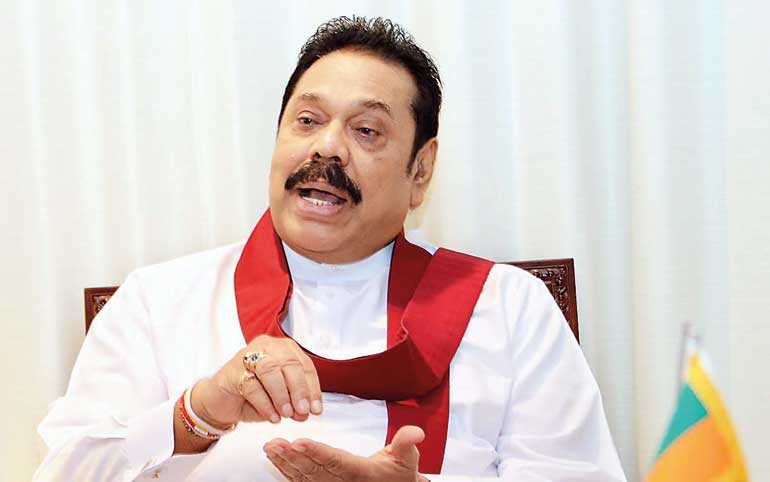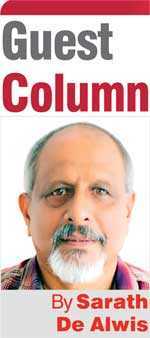Thursday Feb 12, 2026
Thursday Feb 12, 2026
Saturday, 26 October 2019 01:53 - - {{hitsCtrl.values.hits}}
- “The Comrade Wolf knows whom to eat, as the saying goes. It knows whom to eat and is not about to listen to anyone, it seems” – Vladimir Putin

Mahinda Rajapaksa had that authoritative charisma. He was fabulously successful in selling the flawed ideology that his personal interests were the interest of the larger society
On 26 October 2018, a great bolt hit us from an unexpected void. Things changed in giddying succession in a humbling reminder that saints can turn villain in lightning speed.
It is one year since our civic nation came alive to defend the basic law of the land. The insane platitude, speaking truth to power suddenly acquired a surprisingly swift sanity. A unanimous, likeminded, cross party civic alliance held candlelight vigils, public protests to reverse a brazen interference with the proper administration of the basic law of the land. 
The apex court resolved a conundrum that was contrived by politicians keen to drive home the truth about politics. Stripped of the blurbs and verbiage, politics is essentially about power and interests of its practitioners.
We commemorate pivotal passages in time and acknowledge events as certain thresholds that we survived. We do so to remember and demonstrate that despite passage of time we recall the lessons learnt. We remember to preserve the past to prod the present and chart the future. We don’t dismiss the past even when we are told to do so. We refuse to forget the past even when ordered to.
The idea of liberal constitutionalism based on the rule of law rests on a single foundational premise. Everyone including the highest in the land is equally constrained by the constitution not just on paper but in practice. We upheld this foundational premise of constitutionalism. That requires consistent and constant celebration.
Strangely enough, we remember the constitutional gerrymandering that occurred on 26 October 2018 yet again at another threshold point. That of a Presidential Election.
First things first. Why did it happen? While we dislodged Mahinda Rajapaksa from his power pedestal, we forgot his authoritative charisma.
"In recalling the events of October 2018, we are reminded of some tangible truths. Our freedoms are fragile. So are autocrats. No power can attain implicit obedience for long. Power must continually justify itself. Our accumulated experience of October 2018 forms a rampart of conviction to deter future tyrants"
The pioneering German sociologist and formulator of Bureaucratic Theory, Max Weber introduced the term in his essay on types of leadership in modern politics.
In the current context, Mahinda Rajapaksa’s grip on a substantial swathe of the public psyche is highly relevant. Authoritative charismatic leaders do not necessarily have to be the best leader. Very often they are not.
Just as this essay is written, the body of an authoritative charismatic leader – General Francisco Franco is exhumed from the grand mausoleum he built for himself and is reinterred in his family burial ground. A brainwashed nation has come to terms with its terrible past after 44 years.
No matter the passage of time, the past wakes up and leaps to grab the present and redress the future. If it does not happen now, it will happen tomorrow or the day after.
We must return to the subject of authoritative charisma. People tend to follow leaders they admire. An authoritative charismatic leader will summon, mobilise followers through his personality. Even when stripped of effective power and authority. It comes across naturally and without force. Such leaders are invariably authoritarian by nature and claim a special kind of interpersonal behaviour; always communicating with others, empathetic and emotionally focused.
The political resilience of Mahinda Rajapaksa is due to a simple phenomenon – he has convinced his vast retinue that he won the war. General Franco did the same in Spain. Franco occupied the mausoleum he built for nearly a half century.
A president pissed off with the prime minister had to find a person who could hold public imagination in support of the usurpation.
Mahinda Rajapaksa had that authoritative charisma. He was fabulously successful in selling the flawed ideology that his personal interests were the interest of the larger society.
Why do people whose interests are not furthered by an elite leadership, nevertheless agree to be guided by such leaders? Max Weber provides the answer. “Every highly privileged group develops the myth of its natural, especially its blood superiority.”
Weber explains that under conditions of stable distribution of power in a society that retains vestiges of feudal allegiance, that myth is accepted by the negatively privileged group.
If not for the groundswell of unequivocal universal protest and the intervention of the judiciary a constitutional depredation would have acquired the respect and recognition of consensual coitus.
A constitution or an election cannot manufacture a free people. Revolutions do that. A socio-cultural revolution can attempt it by reducing social tensions. The cultural order of a self-governing people is more important than ideology driven politics. At this critical time, we must ask ourselves if we possess the national character necessary for that cultural revolution.
An inclusive, accommodative cultural order is more important than politics. But it should be the product of organic growth not a political program adopted by majority vote. Any other kind of intervention will again produce tyranny.
Current debate on ‘strong man’ politics and constitutional restraints on arbitrary power often refers to the famous ‘power corrupts’ adage.
The quotation is used out of context. It would be useful to revisit the context in which Lord Acton made the remark and reproduce his exact words. Medieval popes just as some of our executive presidents claimed not unbridled power but total infallibility. The exalted office tended to drive them ‘nuts’.
Lord Acton was a well-known campaigner against papal infallibility. As a staunch Catholic he was convinced that moral laws of the church were perfect but popes who were human were imperfect. So, he wrote: “I cannot accept your cannon that we are to judge Pope and King unlike other men, with a favourable presumption that they did no wrong. If there is any presumption it is the other way, against the holders of power, increasing as the power increases. Power tends to corrupt and absolute power corrupts absolutely.”
Then he continued: “Great men are almost always bad men, even when they exercise influence not authority; still more when you add the tendency or the certainty of corruption by authority. There’s no worse heresy than that the office sanctifies the holder of it.”
In recalling the events of October 2018, we are reminded of some tangible truths. Our freedoms are fragile. So are autocrats. No power can attain implicit obedience for long. Power must continually justify itself. Our accumulated experience of October 2018 forms a rampart of conviction to deter future tyrants.